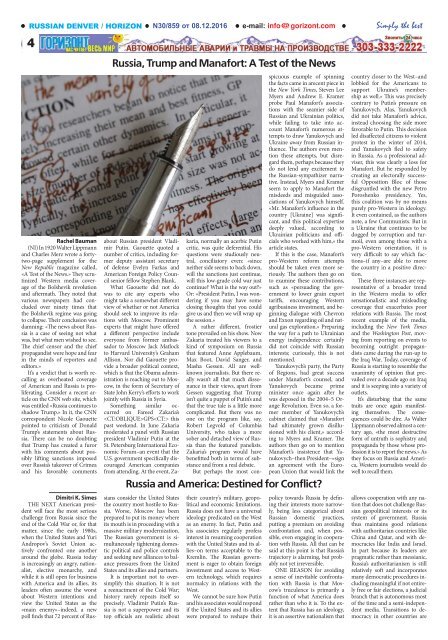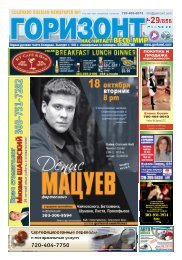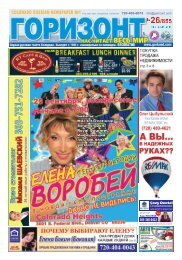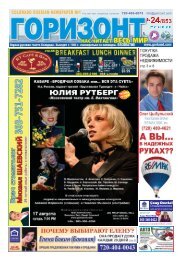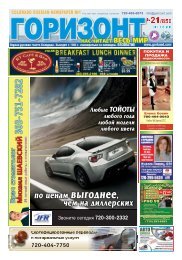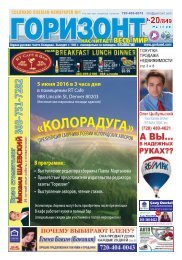Горизонт 30/859
Горизонт (газета) — (Gorizont англ. Horizon ) первая и наиболее влиятельная газета, издающаяся на русском языке в штатеКолорадо, США. Еженедельник, выходит по пятницам, формат Таблоид, 128 цветных и чернобелых страниц, распространяется в городах, составляющих метрополию Денвера (Большой Денвер), и в других населенных пунктах штата Колорадо от графства Саммит до графства Эль—Пасо. Полная электронная версия газеты «Горизонт» доступна в сети Интернет. Подробнее http://en.wikipedia.org/wiki/Gorizont_(newspaper
Горизонт (газета) — (Gorizont англ. Horizon ) первая и наиболее влиятельная газета, издающаяся на русском языке в штатеКолорадо, США. Еженедельник, выходит по пятницам, формат Таблоид, 128 цветных и чернобелых страниц, распространяется в городах, составляющих метрополию Денвера (Большой Денвер), и в других населенных пунктах штата Колорадо от графства Саммит до графства Эль—Пасо. Полная электронная версия газеты «Горизонт» доступна в сети Интернет. Подробнее http://en.wikipedia.org/wiki/Gorizont_(newspaper
Create successful ePaper yourself
Turn your PDF publications into a flip-book with our unique Google optimized e-Paper software.
RUSSIAN DENVER / HORIZON<br />
4<br />
Rachel Bauman<br />
(NI) In 1920 Walter Lippmann<br />
and Charles Merz wrote a fortytwo-page<br />
supplement for the<br />
New Republic magazine called,<br />
«A Test of the News.» They scrutinized<br />
Western media coverage<br />
of the Bolshevik revolution<br />
and aftermath. They noted that<br />
various newspapers had concluded<br />
over ninety times that<br />
the Bolshevik regime was going<br />
to collapse. Their conclusion was<br />
damning: «The news about Russia<br />
is a case of seeing not what<br />
was, but what men wished to see.<br />
The chief censor and the chief<br />
propagandist were hope and fear<br />
in the minds of reporters and<br />
editors.»<br />
It’s a verdict that is worth recalling<br />
as overheated coverage<br />
of American and Russia is proliferating.<br />
Consider a recent article<br />
on the CNN web site, which<br />
was entitled «Russia continues to<br />
shadow Trump.» In it, the CNN<br />
correspondent Nicole Gaouette<br />
pointed to criticism of Donald<br />
Trump’s statements about Russia.<br />
There can be no doubting<br />
that Trump has created a furor<br />
with his comments about possibly<br />
lifting sanctions imposed<br />
over Russia’s takeover of Crimea<br />
and his favorable comments<br />
Russia, Trump and Manafort: A Test of the News<br />
about Russian president Vladimir<br />
Putin. Gaouette quoted a<br />
number of critics, including former<br />
deputy assistant secretary<br />
of defense Evelyn Farkas and<br />
American Foreign Policy Council<br />
senior fellow Stephen Blank.<br />
What Gaouette did not do<br />
was to cite any experts who<br />
might take a somewhat different<br />
view of whether or not America<br />
should seek to improve its relations<br />
with Moscow. Prominent<br />
experts that might have offered<br />
a different perspective include<br />
everyone from former ambassador<br />
to Moscow Jack Matlock<br />
to Harvard University’s Graham<br />
Allison. Nor did Gaouette provide<br />
a broader political context,<br />
which is that the Obama administration<br />
is reaching out to Moscow,<br />
in the form of Secretary of<br />
State John Kerry’s efforts to work<br />
jointly with Russia in Syria.<br />
Something similar occurred<br />
on Fareed Zakaria’s<br />
GPS this<br />
past weekend. In June Zakaria<br />
moderated a panel with Russian<br />
president Vladimir Putin at the<br />
St. Petersburg International Economic<br />
Forum–an event that the<br />
U.S. government specifically discouraged<br />
American companies<br />
from attending. At the event, Zakaria,<br />
normally an acerbic Putin<br />
critic, was quite deferential. His<br />
questions were studiously neutral,<br />
conciliatory even: «since<br />
neither side seems to back down,<br />
will the sanctions just continue,<br />
will this low-grade cold war just<br />
continue? What is the way out?»<br />
Or: «President Putin, I was wondering<br />
if you may have some<br />
closing thoughts that you could<br />
give us and then we will wrap up<br />
the session.»<br />
A rather different, frostier<br />
tone prevailed on his show. Now<br />
Zakaria treated his viewers to a<br />
kind of symposium on Russia<br />
that featured Anne Applebaum,<br />
Max Boot, David Sanger, and<br />
Masha Gessen. All are wellknown<br />
journalists. But there really<br />
wasn’t all that much dissonance<br />
in their views, apart from<br />
Gessen suggesting that Trump<br />
isn’t quite a puppet of Putin’s and<br />
that the true tale is a little more<br />
complicated. But there was no<br />
one on the program like, say,<br />
Robert Legvold of Columbia<br />
University, who takes a more<br />
sober and detached view of Russia<br />
than the featured panelists.<br />
Zakaria’s program would have<br />
benefitted both in terms of substance<br />
and from a real debate.<br />
But perhaps the most conspicuous<br />
example of spinning<br />
the facts came in arecent piece in<br />
the New York Times, Steven Lee<br />
Myers and Andrew E. Kramer<br />
probe Paul Manafort’s associations<br />
with the seamier side of<br />
Russian and Ukrainian politics,<br />
while failing to take into account<br />
Manafort’s numerous attempts<br />
to draw Yanukovych and<br />
Ukraine away from Russian influence.<br />
The authors even mention<br />
these attempts, but disregard<br />
them, perhaps because they<br />
do not lend any excitement to<br />
the Russian-sympathizer narrative.<br />
Instead, Myers and Kramer<br />
seem to apply to Manafort the<br />
misdeeds and misguided associations<br />
of Yanukovych himself.<br />
«Mr. Manafort’s influence in the<br />
country [Ukraine] was significant,<br />
and this political expertise<br />
deeply valued, according to<br />
Ukrainian politicians and officials<br />
who worked with him,» the<br />
article states.<br />
If this is the case, Manafort’s<br />
pro-Western reform attempts<br />
should be taken even more seriously.<br />
The authors then go on<br />
to examine these contributions,<br />
such as «persuading the government<br />
to lower grain export<br />
tariffs, encouraging Western<br />
agribusiness investment, and beginning<br />
dialogue with Chevron<br />
and Exxon regarding oil and natural<br />
gas exploration.» Preparing<br />
the way for a path to Ukrainian<br />
energy independence certainly<br />
did not coincide with Russian<br />
interests; curiously, this is not<br />
mentioned.<br />
Yanukovych’s party, the Party<br />
of Regions, had great success<br />
under Manafort’s counsel, and<br />
Yanukovych became prime<br />
minister once again after he<br />
was deposed in the 2004–5 Orange<br />
Revolution. Even so, a former<br />
member of Yanukovych’s<br />
cabinet claimed that «Manafort<br />
had ultimately grown disillusioned<br />
with his client,» according<br />
to Myers and Kramer. The<br />
authors then go on to mention<br />
Manafort’s insistence that Yanukovych–then<br />
President–»sign<br />
an agreement with the European<br />
Union that would link the<br />
Russia and America: Destined for Conflict?<br />
Dimitri K. Simes<br />
THE NEXT American president<br />
will face the most serious<br />
challenge from Russia since the<br />
end of the Cold War or, for that<br />
matter, since the early 1980s,<br />
when the United States and Yuri<br />
Andropov’s Soviet Union actively<br />
confronted one another<br />
around the globe. Russia today<br />
is increasingly an angry, nationalist,<br />
elective monarchy, and<br />
while it is still open for business<br />
with America and its allies, its<br />
leaders often assume the worst<br />
about Western intentions and<br />
view the United States as the<br />
«main enemy»–indeed, a new<br />
poll finds that 72 percent of Russians<br />
consider the United States<br />
the country most hostile to Russia.<br />
Worse, Moscow has been<br />
prepared to put its money where<br />
its mouth is in proceeding with a<br />
massive military modernization.<br />
The Russian government is simultaneously<br />
tightening domestic<br />
political and police controls<br />
and seeking new alliances to balance<br />
pressures from the United<br />
States and its allies and partners.<br />
It is important not to oversimplify<br />
this situation. It is not<br />
a reenactment of the Cold War;<br />
history rarely repeats itself so<br />
precisely. Vladimir Putin’s Russia<br />
is not a superpower and its<br />
top officials are realistic about<br />
N<strong>30</strong>/<strong>859</strong> от 08.12.2016 e-mail: info@gorizont.com Simply the best<br />
their country’s military, geopolitical<br />
and economic limitations.<br />
Russia does not have a universal<br />
ideology predicated on the West<br />
as an enemy. In fact, Putin and<br />
his associates regularly profess<br />
interest in resuming cooperation<br />
with the United States and its allies–on<br />
terms acceptable to the<br />
Kremlin. The Russian government<br />
is eager to obtain foreign<br />
investment and access to Western<br />
technology, which requires<br />
normalcy in relations with the<br />
West.<br />
We cannot be sure how Putin<br />
and his associates would respond<br />
if the United States and its allies<br />
were prepared to reshape their<br />
policy towards Russia by defining<br />
their interests more narrowly,<br />
being less categorical about<br />
Russian domestic practices,<br />
putting a premium on avoiding<br />
confrontation and, when possible,<br />
even engaging in cooperation<br />
with Russia. All that can be<br />
said at this point is that Russia’s<br />
trajectory is alarming, but probably<br />
not yet irreversible.<br />
ONE REASON for avoiding<br />
a sense of inevitable confrontation<br />
with Russia is that Moscow’s<br />
truculence is primarily a<br />
function of what America does<br />
rather than who it is. To the extent<br />
that Russia has an ideology,<br />
it is an assertive nationalism that<br />
country closer to the West–and<br />
lobbied for the Americans to<br />
support Ukraine’s membership<br />
as well.» This was precisely<br />
contrary to Putin’s pressure on<br />
Yanukovych. Alas, Yanukovych<br />
did not take Manafort’s advice,<br />
instead choosing the side more<br />
favorable to Putin. This decision<br />
led disaffected citizens to violent<br />
protest in the winter of 2014,<br />
and Yanukovych fled to safety<br />
in Russia. As a professional adviser,<br />
this was clearly a loss for<br />
Manafort. But he responded by v<br />
creating an electorally successful<br />
Opposition Bloc of those<br />
disgruntled with the new Petro<br />
Poroshenko presidency. Yes,<br />
this coalition was by no means<br />
purely pro-Western in ideology.<br />
It even contained, as the authors<br />
note, a few Communists. But in<br />
a Ukraine that continues to be<br />
dogged by corruption and turmoil,<br />
even among those with a<br />
pro-Western orientation, it is<br />
very difficult to say which factions–if<br />
any–are able to move<br />
the country in a positive direction.<br />
These three instances are representative<br />
of a broader trend<br />
in the Western media to offer<br />
sensationalistic and misleading<br />
coverage that exacerbates poor<br />
relations with Russia. The most<br />
recent example of the media,<br />
including the New York Times<br />
and the Washington Post, moving<br />
from reporting on events to<br />
becoming outright propagandists<br />
came during the run-up to<br />
the Iraq War. Today, coverage of<br />
Russia is starting to resemble the<br />
unanimity of opinion that prevailed<br />
over a decade ago on Iraq<br />
and it is seeping into a variety of<br />
outlets.<br />
It’s disturbing that the same<br />
traits are once again manifesting<br />
themselves. The consequences<br />
could be dire. As Walter<br />
Lippmann observed almost a century<br />
ago, «the most destructive<br />
form of untruth is sophistry andp<br />
propaganda by those whose profession<br />
it is to report the news.» As<br />
they focus on Russia and America,<br />
Western journalists would do<br />
well to recall them.<br />
allows cooperation with any nation<br />
that does not challenge Russian<br />
geopolitical interests or its<br />
system of government. Russia<br />
thus maintains good relations<br />
with authoritarian countries like<br />
China and Qatar, and with democracies<br />
like India and Israel.<br />
In part because its leaders are<br />
pragmatic rather than messianic,<br />
Russia’s authoritarianism is still<br />
relatively soft and incorporates<br />
many democratic procedures including<br />
meaningful if not entirely<br />
free or fair elections, a judicial<br />
branch that is autonomous most<br />
of the time and a semi-independent<br />
media. Transitions to democracy<br />
in other countries are


